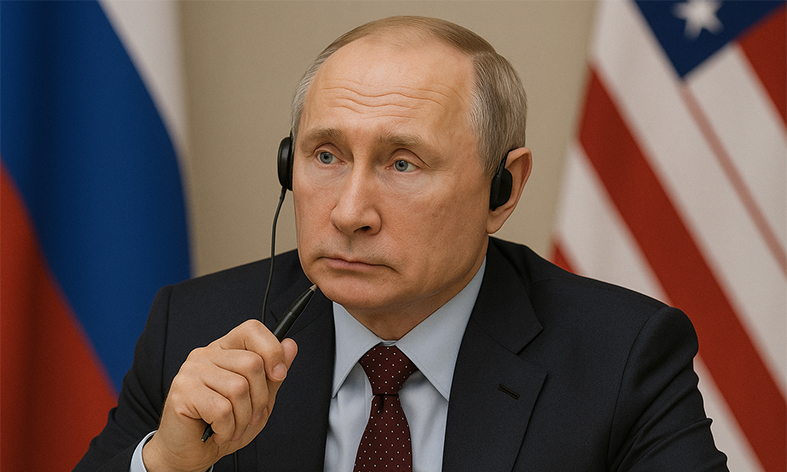Putin does speak English functionally. He handles small talk, briefings, and scripted moments, but defaults to Russian for nuance, legal precision, and leverage via an interpreter. You’ll see him use English tactically: toasts, pleasantries, calibrated jokes—measured, rehearsed, and controlled.
Celebrities, meanwhile, chase English for reach, roles, and brand power, learning in focused sprints with coaches, high-frequency vocab, and performance-ready lines. Together, it’s power plus market math—and there’s more to unpack about methods that actually work.
How Fluent Is Vladimir Putin in English?
Although he’s occasionally seen conversing in English, Vladimir Putin’s fluency is best described as functional but limited, especially for high-stakes contexts. You’ll notice he understands routine exchanges, technical briefings, and small talk, but he’s cautious with nuance, idiom, and rapid back-and-forth.
Putin's language skills reflect pragmatic training from his KGB and diplomatic background: adequate comprehension, restrained spontaneity. Putin's communication style prioritizes control, legalistic precision, and strategic ambiguity, which English—when unscripted—can complicate.
You can expect measured answers, slower cadence, and reliance on prepared phrases. He favors Russian to preserve subtlety, humor, and authority, minimizing risks of misinterpretation or rhetorical concessions.
When and Why Putin Chooses an Interpreter
When the stakes involve legal nuance, strategic signaling, or high-speed negotiation, Putin opts for an interpreter to control precision and tempo.
You’ll notice the choice isn’t about ability alone; it’s about leverage. Interpreter selection in diplomatic settings lets him calibrate ambiguity, protect face, and keep messages aligned with domestic narratives. It also slows exchanges, giving aides time to coordinate.
- Maintain legal precision and plausible deniability.
- Shape tone, pauses, and emphasis for maximum leverage.
- Filter idioms and cultural subtext to avoid missteps.
- Control pacing to manage negotiation dynamics.
You’re seeing language as statecraft: a deliberate buffer that reinforces hierarchy, message discipline, and strategic ambiguity.
Famous Moments of Putin Speaking English on Camera
That strategic reliance on interpreters makes the unscripted English moments stand out, because each one signals intent as much as proficiency. You notice them in brief toasts, summit pleasantries, and carefully framed English interviews, where a few direct sentences reset tone without ceding control.
He’s used English to congratulate hosts, deflect a jab, or land a calibrated joke—micro-diplomacy that complements Putin's speeches delivered via translation. You hear measured pronunciation, limited idiom, and deliberate pacing, suggesting rehearsal rather than fluency. The effect is tactical: he humanizes when useful, narrows ambiguity when stakes are high, and reverts to Russian when precision dominates.
How Celebrities Learn English: Motivations and Methods
Because fame is global and work crosses borders, celebrities tend to learn English for leverage: bigger roles, wider audiences, smoother press tours, and brand deals that hinge on spontaneous charm.
You see celebrity motivations aligning with market math: English expands revenue and soft power, especially in Hollywood, fashion, music, and sports. Prestige matters too—fluency signals cosmopolitan credibility. Their learning methods are pragmatic, time-bound, and coach-led, optimized for performance contexts.
- Accent reduction with dialect coaches for scripts and interviews.
- Intensive tutoring on sets, tours, and flights.
- Memorization-first dialogue drilling, then improvisation.
- Media immersion: podcasts, tabloids, late-night banter.
You’re watching ambition translated into speech.
Practical Language-Learning Takeaways From Public Figures
Although their lives seem distant from yours, public figures offer concrete habits you can steal: set outcome-driven goals (a role, a tour, a promotion), compress learning into focused sprints, and practice in the exact context you’ll perform.
Treat language acquisition like training for a premiere: rehearse lines, refine timing, then stress-test under lights. Prioritize high-frequency vocabulary tied to your domain. For public speaking, script tight, mark pauses, and record yourself to calibrate tone and pace. Use coaches or peer feedback for immediate correction.
Also,One of the most successful ways to learn English is by watching movies or documentaries on platforms like YouTube, Netflix, or IPTV. This approach helps improve language skills, expands vocabulary, and provides a deeper understanding of different cultures and accents.
Frequently Asked Questions
Did Putin Study Other Foreign Languages Besides English?
Yes. You’d note Putin’s language background includes fluent German from KGB service in Dresden, with limited English. Foreign language influences stem from Soviet-era intelligence training, pragmatic diplomacy, and cultural immersion, shaping pragmatic communication skills rather than broad multilingual proficiency.
Which English Accents Does Putin Understand Best?
You’ll find he likely understands standard American and Received Pronunciation best. Your English comprehension improves his Accent preferences: slower delivery, clear articulation, diplomatic vocabulary. You shouldn’t expect easy comprehension of rapid slang, strong regional dialects, or overlapping conversation.
Has Putin Taken Formal English Proficiency Tests?
No. You won’t find evidence he’s taken formal English proficiency tests. You’ll rely on public interpreters’ use and sporadic English remarks. In Russia’s elite culture, language testing isn’t customary; proficiency is demonstrated informally in diplomacy and controlled media appearances.
Do Interpreters Coach Putin Before High-Stakes Meetings?
Yes. You’re typically prepped by interpreters using interpreter techniques: anticipated vocabulary, calibrated phrasing, and scenario drills. This sharpens diplomatic communication, aligns messaging with cultural context, minimizes ambiguity, and ensures strategic deniability during sensitive, high-stakes exchanges.
Which Celebrities Learned English for Family Reasons Rather Than Work?
You’d note Mila Kunis, Charlize Theron, and Sofia Vergara—each strengthened English for family language cohesion, not just careers. Their celebrities’ motivations include integrating in diaspora communities, supporting children’s schooling, and bridging intergenerational ties, reflecting migration-driven, culturally adaptive choices beyond professional necessity.














